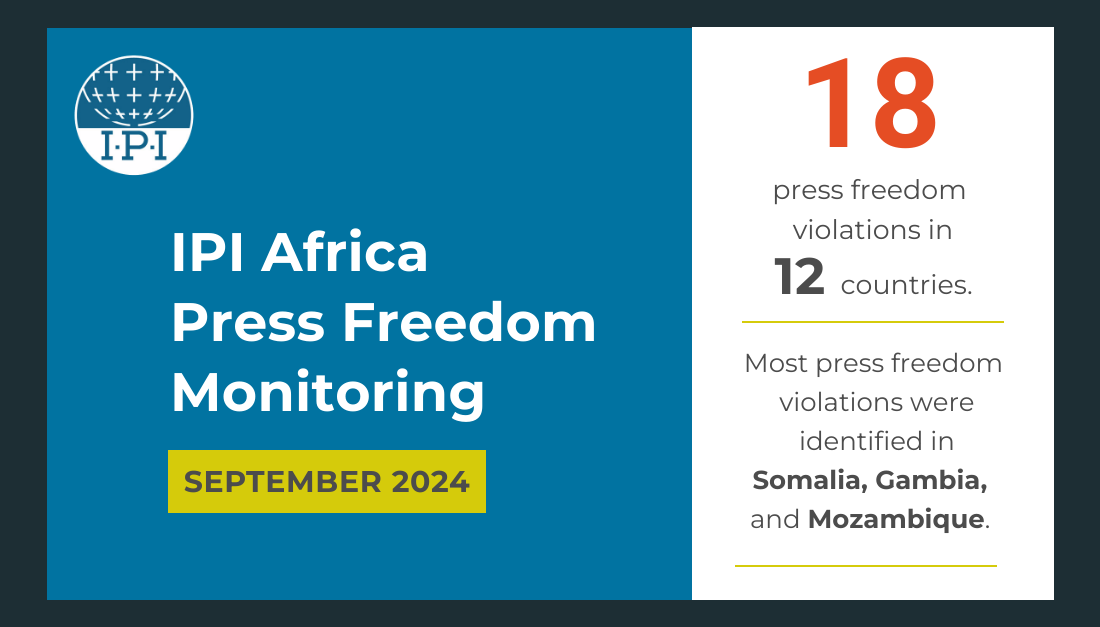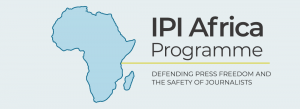In September 2024, IPI’s Africa monitoring programme recorded at least 18 incidents of threats to press freedom in 12 countries across sub-Saharan Africa.
State actors remain the leading source of attacks and threats to journalists, and were responsible for all of the incidents IPI recorded in September 2024 (this includes incidents linked to the Sudanese Rapid Support Forces (RSF), a paramilitary group formerly operated by the Sudanese government and one of the two main parties in Sudan’s ongoing civil conflict). Within this broader category, the police/state security agents (50%) and government/public officials (38.89%) were the leading source of incidents and threats affecting press freedom.
See the factsheet below or download it here.
DOWNLOAD THE FACTSHEET HERE (PDF FILE)
In Sudan, journalist Mubarak Musa Juma and media worker Othman Al-Tahir were killed on September 30 and 14, respectively, in El Fasher. The Sudanese Journalists Syndicate (SJS) told IPI that given the complexity of the situation in El Fasher, it was unclear whether Juma was killed while on assignment or whether he was a victim of the broader shelling of the city. Juma worked at several news outlets as well as the media office of the Darfur government. Al-Tahir died in an RSF detention center. His family was notified of his death 10 days later. It is unclear whether he was killed or whether he died possibly due to poor treatment he received in detention. Al-Tahir worked as a driver for the General Authority for Radio and Television news and coverage department, while his wife worked as a radio program producer.
In Somalia, on September 16, journalist Amina Ibrahim Abdirahman, who works for the private broadcaster Arlaadi Media, was subjected to verbal threats and intimidation during a press conference at the Ministry of Foreign Affairs building in Mogadishu. According to the local press defense group SJS, Mohamed Abdi Waare, the deputy executive secretary of the Intergovernmental Authority on Development (IGAD) and the former president of Somalia’s Hirshabelle regional state, interrupted Abdirahman and ordered her to stop asking questions.
On September 26 in The Gambia, police arrested two journalists of the Voice Newspaper, Mamadou Darboe and Musa Sheriff. Their arrest occurred after the publication of an article on the reported “exit plan” of the current President Adama Barrow ahead of the 2026 elections. Both of them were released on bail, but the duo was charged with false publication and broadcasting and requested to report daily to the police. The Gambia Press Union (GPU) condemned the arrest of both journalists and urged the police to drop all charges against them.
In Mozambique, on September 11, two journalists of Rádio Chuabo based in Quelimane city, the capital of Zambezia province were prevented from covering the campaign of the ruling Frelimo party for the presidential, parliamentary, and provincial elections scheduled for October 9. According to MISA Mozambique , Mariamo Amade, the District Secretary of the Frelimo women’s branch (OMM) in Quelimane, blocked journalists Valeriano Evaristo and Leonarda Domingos, even though they had their accreditation. She allegedly pretended that the journalists were not authorized by the party’s higher structures at the district level to work with Rádio Chuabo FM.
Elsewhere, public prosecutors in three Sahel countries, Burkina Faso, Mali and Niger, launched a joint investigation on September 25 against France 24 journalist Wassim Nasr. This is the latest move by authorities in these countries targeting foreign media, particularly French journalists and media outlets. According to reports, the journalist is accused of being an “apologist for terrorism” over his analysis of jihadist attacks. The investigations stem from Nasr’s in-depth commentary on recent acts of terrorism in the region, specifically the September 17 terrorist attacks in Bamako, the capital city of Mali.

